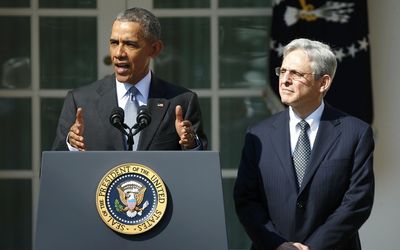Key Republicans warm to Obama judge
by Megan Cassella and Susan Heavey,
2016-03-18 07:19:07.0
TWO key US Senate Republicans signalled they would be open to considering President Barack Obama’s Supreme Court nomination of Merrick Garland after the November 8 presidential election. The centrist judge was set to begin meeting senators yesterday.
The comments by Utah’s Orrin Hatch and Arizona’s Jeff Flake, members of the judiciary committee that would hold any confirmation hearings, came a day after Mr Obama nominated Judge Garland to the lifetime position on the high court to replace conservative Judge Antonin Scalia, who died on February 13.
Senate Republican leaders have adamantly vowed not to hold confirmation hearings or an up-or-down vote on any Supreme Court nominee put forward by Mr Obama, whose term ends in January next year.
They want the next president to make the selection, hoping a Republican wins November’s election.
Mr Flake said while Republican leaders were "fully justified" in delaying action on confirmation, if the Republicans lose the White House race the Republican-led Senate "ought to look at this nomination in a lame-duck session in November". A lame-duck session refers to the final months of a president’s term after his successor is elected in November, but before a new Congress convenes in early January.
A president’s Supreme Court nominee requires Senate confirmation.
"I would rather have a less liberal nominee like Merrick Garland than a nominee that Hillary Clinton, if she were president, would put forward," Mr Flake told Fox News Channel.
Billionaire businessman Donald Trump is the frontrunner for the Republican nomination in the presidential election. Ms Clinton is the Democratic frontrunner.
Mr Hatch, the former chairman of the judiciary committee and its number two Republican behind chairman Chuck Grassley of Iowa, in 1997 worked to get Judge Garland confirmed in his current position on the US court of appeals for the District of Columbia circuit.
The Senate at that time voted to confirm Judge Garland in a bipartisan 76-23 vote.
"To this day, I think well of Merrick Garland, and I think he’s a fine person," Mr Hatch told National Public Radio.
"I remain convinced that the best way for the Senate to do its job is to conduct the confirmation process after this toxic presidential election season is over," he added.
Judge Garland was scheduled to venture to Capitol Hill to begin the customary meetings with senators that typically kick off the confirmation process. He was set to meet Senate Democratic leader Harry Reid of Nevada and Vermont’s Patrick Leahy, the top judiciary committee Democrat.
Widely viewed as a moderate, Judge Garland, 63, is the chief judge on his appellate court and a former prosecutor involved in cases including the Oklahoma City bombing trial.
White House chief of staff Denis McDonough said the White House was prepared for a confirmation process that would take some time, but expected Senate Republicans eventually would hold a vote on Judge Garland’s nomination. "We’ll see how this develops over the course of the next several weeks and months," he said.
Democrats are hoping the presence of Judge Garland, who is likely to be a fixture in the Senate hallways over the coming weeks, will amp up pressure on Republicans to relent and give him a hearing — or pay a price at the ballot box in November.
The battle over Judge Scalia’s seat has the potential to shape the Supreme Court for a decade or two, and whoever is confirmed would be a pivotal vote on a number of divisive issues.
Senate Democrats are betting that Republicans will begin to splinter and eventually cave under public pressure. In particular, they are eyeing several Republican senators who are facing tough re-election fights.
Indeed, several Republicans said on Wednesday they would agree to meet with Judge Garland, while Mark Kirk of Illinois said the Senate should consider Judge Garland’s nomination.
Democrats also pointed to the remarks by Mr Hatch that legislators might consider confirming Judge Garland after the election if Ms Clinton wins the presidential contest.
"Republicans are backing down so quickly that they’re already bargaining about what month they will fully cave and confirm Judge Garland," Mr Reid said in a statement.
Bloomberg

US President Barack Obama (left) announces Judge Merrick Garland as his nominee to the US Supreme Court, in the White House Rose Garden in Washington, on Wednesday. Picture: REUTERS/KEVIN LAMARQUE
TWO key US Senate Republicans signalled they would be open to considering President Barack Obama’s Supreme Court nomination of Merrick Garland after the November 8 presidential election. The centrist judge was set to begin meeting senators yesterday.
The comments by Utah’s Orrin Hatch and Arizona’s Jeff Flake, members of the judiciary committee that would hold any confirmation hearings, came a day after Mr Obama nominated Judge Garland to the lifetime position on the high court to replace conservative Judge Antonin Scalia, who died on February 13.
Senate Republican leaders have adamantly vowed not to hold confirmation hearings or an up-or-down vote on any Supreme Court nominee put forward by Mr Obama, whose term ends in January next year.
They want the next president to make the selection, hoping a Republican wins November’s election.
Mr Flake said while Republican leaders were "fully justified" in delaying action on confirmation, if the Republicans lose the White House race the Republican-led Senate "ought to look at this nomination in a lame-duck session in November". A lame-duck session refers to the final months of a president’s term after his successor is elected in November, but before a new Congress convenes in early January.
A president’s Supreme Court nominee requires Senate confirmation.
"I would rather have a less liberal nominee like Merrick Garland than a nominee that Hillary Clinton, if she were president, would put forward," Mr Flake told Fox News Channel.
Billionaire businessman Donald Trump is the frontrunner for the Republican nomination in the presidential election. Ms Clinton is the Democratic frontrunner.
Mr Hatch, the former chairman of the judiciary committee and its number two Republican behind chairman Chuck Grassley of Iowa, in 1997 worked to get Judge Garland confirmed in his current position on the US court of appeals for the District of Columbia circuit.
The Senate at that time voted to confirm Judge Garland in a bipartisan 76-23 vote.
"To this day, I think well of Merrick Garland, and I think he’s a fine person," Mr Hatch told National Public Radio.
"I remain convinced that the best way for the Senate to do its job is to conduct the confirmation process after this toxic presidential election season is over," he added.
Judge Garland was scheduled to venture to Capitol Hill to begin the customary meetings with senators that typically kick off the confirmation process. He was set to meet Senate Democratic leader Harry Reid of Nevada and Vermont’s Patrick Leahy, the top judiciary committee Democrat.
Widely viewed as a moderate, Judge Garland, 63, is the chief judge on his appellate court and a former prosecutor involved in cases including the Oklahoma City bombing trial.
White House chief of staff Denis McDonough said the White House was prepared for a confirmation process that would take some time, but expected Senate Republicans eventually would hold a vote on Judge Garland’s nomination. "We’ll see how this develops over the course of the next several weeks and months," he said.
Democrats are hoping the presence of Judge Garland, who is likely to be a fixture in the Senate hallways over the coming weeks, will amp up pressure on Republicans to relent and give him a hearing — or pay a price at the ballot box in November.
The battle over Judge Scalia’s seat has the potential to shape the Supreme Court for a decade or two, and whoever is confirmed would be a pivotal vote on a number of divisive issues.
Senate Democrats are betting that Republicans will begin to splinter and eventually cave under public pressure. In particular, they are eyeing several Republican senators who are facing tough re-election fights.
Indeed, several Republicans said on Wednesday they would agree to meet with Judge Garland, while Mark Kirk of Illinois said the Senate should consider Judge Garland’s nomination.
Democrats also pointed to the remarks by Mr Hatch that legislators might consider confirming Judge Garland after the election if Ms Clinton wins the presidential contest.
"Republicans are backing down so quickly that they’re already bargaining about what month they will fully cave and confirm Judge Garland," Mr Reid said in a statement.
Bloomberg




















Change: 1.19%
Change: 1.36%
Change: 2.19%
Change: 1.49%
Change: -0.77%
Data supplied by Profile Data
Change: -0.08%
Change: 0.12%
Change: 1.19%
Change: 0.00%
Change: 0.10%
Data supplied by Profile Data
Change: 0.33%
Change: 0.39%
Change: 0.34%
Change: 0.22%
Change: 0.23%
Data supplied by Profile Data
Change: 0.05%
Change: -0.51%
Change: -0.13%
Change: -0.17%
Change: 0.31%
Data supplied by Profile Data